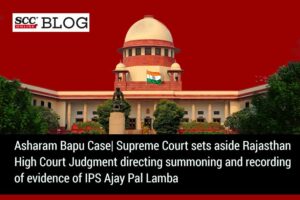Supreme Court: In an appeal filed by the State against the Judgment of the Rajasthan High Court allowing the application filed by the Asharam Bapu under Section 391 of the Code of Criminal Procedure, 1973 (‘CrPC’), and directing summoning and recording of evidence of Ajay Pal Lamba, Deputy Commissioner of Jodhpur Police who has written a book “Gunning For The Godman: The True Story Behind Asharam Bapu’s Conviction”, the Division Bench of Sanjiv Khanna and MM Sundresh, JJ. refrained from examining whether there is sufficient evidence and material to uphold the conviction of Asharam, as the questions of merits are to be considered by the High Court while adjudicating the criminal appeal against conviction and held that the test to allow additional evidence is not satisfied. Thus, set aside the impugned judgment.
Asharam has been convicted for the offences under Sections 370(4), 342, 354-A, 376(2)(f), 376-D, 506, 509/34 and 120-B of the Penal Code, 1860, (‘IPC’) and Sections 23 and 26 of the Juvenile Justice (Care and Protection of Children) Act, 2000, and Sections 5(f) read with Section 6, Section 5(g) read with Section 6, and Section 8 of the POCSO Act. He was sentenced to undergo rigorous imprisonment for different periods, and life imprisonment for the remainder of his natural life, with fine and default stipulations.
The Court noted that the impugned judgment refers to quotes from a portion of the Book, and further noted that the application under Section 391 CrPC for summoning and recording evidence of Ajay Pal Lamba has been allowed primarily relying on the following statement by Ajay Pal Lamba in the Book that “while I was there, I thought it would be prudent to film a video of the place on my mobile phone, should I need to refer to it at some point during the course of the investigation. And so, I did.”
The Court said that this statement nowhere mentions that the video, which he had purportedly recorded on his mobile phone, was handed over, given or transferred by him to the Investigating Officer or that it was shown by him to the victim. Further, opined that when the prosecution states that on 21-08-2013 the police team had visited the scene of the crime (Kutiya), the plea to examine Ajay Pal Lamba on the ground that he had purportedly recorded a video of the ‘Kutiya’ on his mobile phone is completely inconsequential and irrelevant to the factual matrix of the present case.
The Court opined that the impugned judgment is unsustainable and mistaken in both facts and law. The reasoning is based upon mere conjectures, and that too without appreciating the scope and object of Section 391 of the CrPC. Thus, the Court rejected the arguments raised by Asharam Bapu and the grounds/reasoning given by the High Court.
The Court while applying the law laid down in State (NCT of Delhi) v. Shiv Kumar Yadav, (2016) 2 SCC 402 that “recall is certainly permitted if essential for the just decision and for which there should be a tangible reason that fair trial would suffer without it. The discretion is to be exercised judiciously to prevent failure of justice and must not be exercised arbitrarily”, and opined that Appellate Court must be equally, if not more cautious, of the desire to delay the hearing of the appeal, or the attempt to lead additional evidence to explore a chance of contradictory evidence. While the prayer for leading additional evidence should be permitted to correct a bona fide error or otherwise, and a party may be entitled to further opportunity without any fault on the part of the opposite party, the request for recall should be bona fide and is to be balanced carefully with relevant considerations, including hardship to the witness and delay of the proceedings.
The Bench took note of Girish Kumar Suneja v. CBI, (2017) 14 SCC 809, P. Ponnusamy v. State of T.N., 2022 SCC OnLine SC 1543 and State of W.B. v. Amiya Kumar Biswas, (2004) 13 SCC 671 the Court said that right to speedy trial, including speedy disposal of an appeal, is not the exclusive right of an accused, but an obligation of the court towards society in general, and the victim in particular.
Thus, the Bench held that the test to allow additional evidence is not satisfied. Further, the criminal appeal, which is ripe for hearing before the High Court, has not been taken up and has been delayed by moving the application under Section 391 of the CrPC. for recording of additional evidence, which was filed nearly eight years after the date of occurrence.
The Court said that this is an attempt to re-open the entire case and seek re-examination of these witnesses at the appellate stage. Thus, the Court, while setting aside the impugned judgment, requested the High Court to take up the appeal for an expeditious hearing as Asharam Bapu has already suffered incarceration for nearly ten years.
[State of Rajasthan v. Asharam, 2023 SCC OnLine SC 423, decided on 17-04-2023]
*Judgment authored by: Justice Sanjiv Khanna

